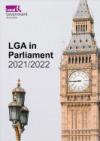Welcome to our Local Government Association (LGA) in Parliament report for 2021/22. As the voice of local government, the LGA continues to engage parliamentarians on the various issues impacting councils and promote the value of local leadership to create sustainable growth, improved public services and a stronger society. We are pleased to provide an update on our engagement with MPs and Peers.
Councils having been pivotal to leading local communities as the nation recovers from the COVID-19 pandemic. The value of local leadership was evident as councils distributed funding from central government to support local economies, as well as vulnerable households. Councils also worked hard to reduce some of the health inequalities exposed by the pandemic and improve people's opportunities for better health at the same time as providing vital care services to children and adults. Councils worked tirelessly to combat rough sleeping and to deliver housing to local people. At the same time, councils have supported those fleeing war and persecution working to welcome new arrivals from Ukraine, Afghanistan and other parts of the world into local communities. This work has been undertaken against the backdrop of a warming climate and councils have been at the forefront of communities’ efforts in combating climate change, as demonstrated during the COP26 Summit.
The LGA has continued to campaign on behalf of our membership and, with the support of MPs and Peers, we have taken every opportunity to help inform the scrutiny of policy and legislation. We have informed a wide range of legislation as we sought to shape proposals on issues that matter to councils such as on building safety and integrating health and care. The LGA continues to be one of the organisations that engages with parliamentary committees the most and we continue to provide thought leadership on a range of issues, including on the future governance of the UK, adult social care and support and the future funding of local government, setting out the challenges councils face and the opportunities to do things differently. This report highlights the breadth of services provided by councils and the depth of analysis provided by the LGA as we advocate on behalf of councils for positive change.
The next parliamentary session could potentially be the busiest legislative programme in over 15 years, with a package of draft reforms compromising of 38 Bills, the highest number announced for a parliamentary session since 2005. The LGA will once more be looking to influence the wide-ranging legislative agenda, working with MPs and Peers on the priorities for our membership, including the government’s proposals to level-up local communities and empower local leaders to address key challenges facing their places. We look forward to working with Government and Parliament on the full range of the legislation and White Papers over the next year.
We would like to thank our LGA Vice-Presidents and all the MPs and Peers who have worked to support us and local government over the past year and we look forward to continuing to work with them and with government to shape the coming legislative agenda. We also thank colleagues across local government who have given time from their schedules to share their experiences and insights in evidence to various parliamentary committee on behalf of the LGA, on behalf of one of our special interest groups, or on behalf of their own councils. This report, and the LGA’s efforts to shape the parliamentary agenda, would not be possible without their support. The LGA we will continue to ensure that councils speak with one voice as shape the national political agenda and that it continues to enable local people to make local decisions that impact them.



